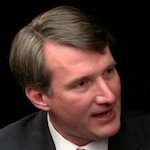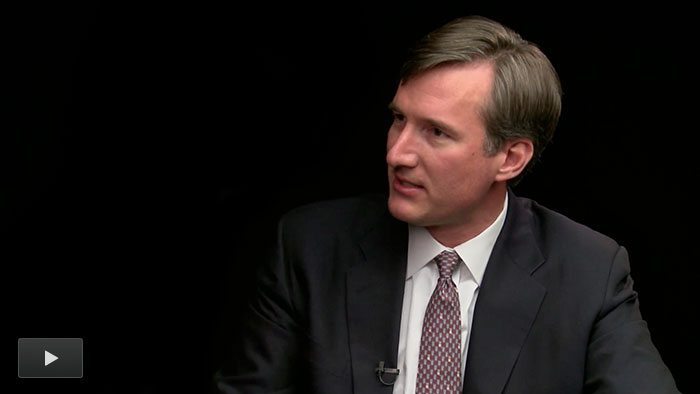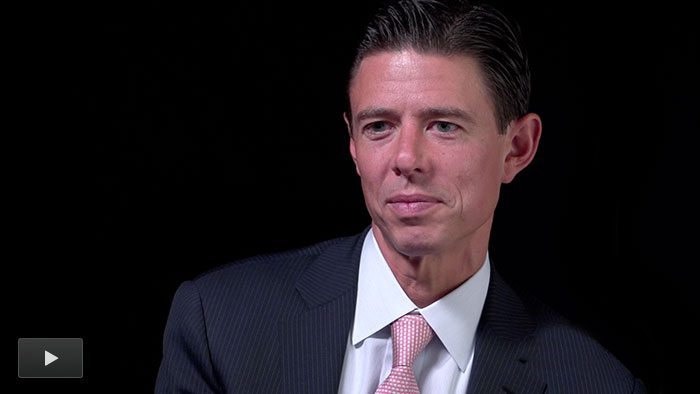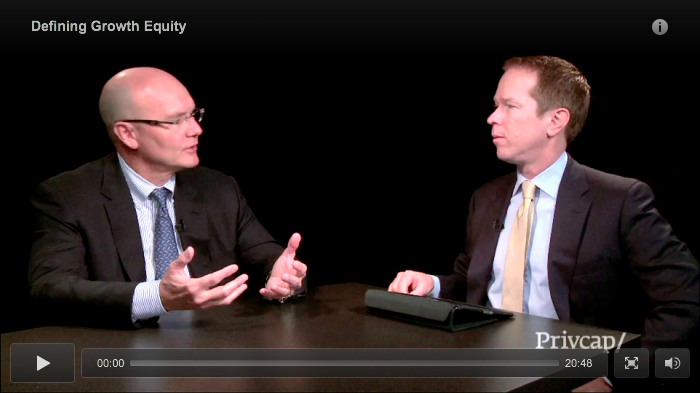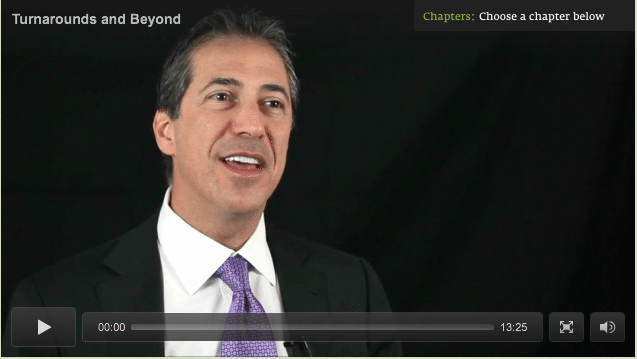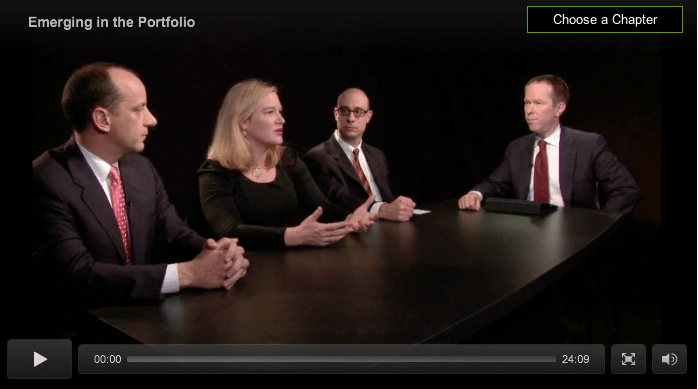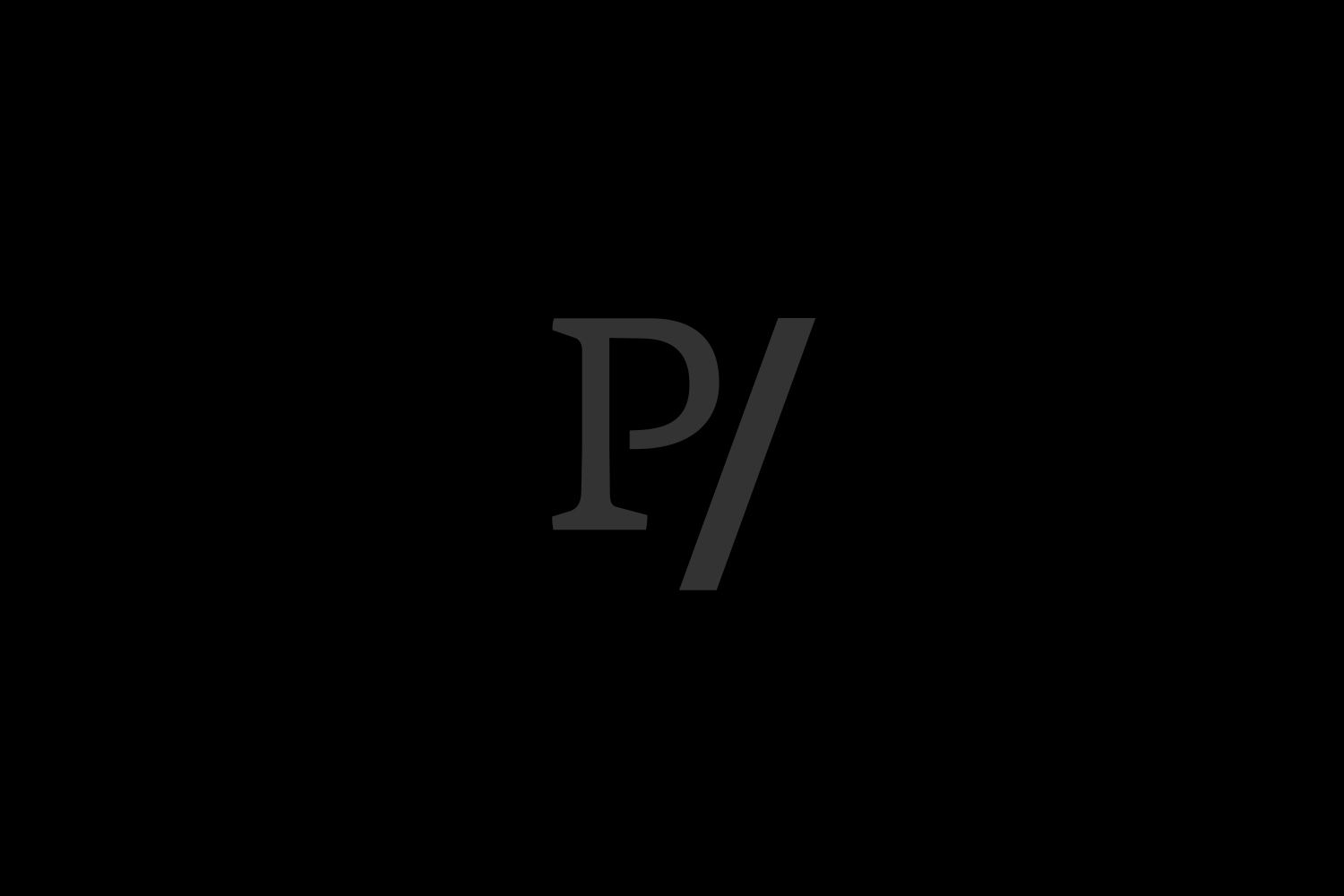Carlyle’s World
Take a tour through the world view and inner workings of The Carlyle Group with a next-generation leader of the firm. In a fascinating, wide-ranging interview with Privcap’s David Snow, Carlyle COO Glenn Youngkin describes the firm’s macro reading of the globe, how the three founders make decisions, and his own role at the firm. This is the first of a two-segment interview.
Topics discussed include: What the performance Carlyle’s 200-plus portfolio companies indicate about the state of the global economy, what was behind the “surprisingly slow” fourth quarter of 2012, warning signs in the “go-go days” of 2007, how Youngkin’s “deal guy” background informs his leadership style, what it was like to work at Carlyle in the mid-1990s before “we woke up and had this enormous firm,” and how he responds to questions that include the word “succession.”
Transcript Download Transcript
David Snow, Privcap: We are joined today by Glenn Youngkin of the Carlyle Group. Glenn, welcome to Privcap today.
You are in the senior leadership of one of the largest private capital firms in the world, and so I’m fascinated to hear your perspective, not only on the world—because Carlyle is active everywhere in just about every strategy—but also about what makes Carlyle a unique organization. And finally, we’d like to learn a bit more about you and your role at Carlyle.
First of all, as COO of the Carlyle Group, what does that mean? What do you do, and what is your relationship with the founders of the firm?
Genn Youngkin, The Carlyle Group: Right. Well, David, thank you for having me. No better topic to talk about, in my mind, than Carlyle, other than maybe my children.
First of all, the chief-operating-officer title at Carlyle was one I think that the founders kind of just gave me because they didn’t know what else to call me, and it fit well because Dan D’Aniello serves as our chairman, and he chairs our board, and he still is chairman of all our real estate fund investment committees. Bill Conway is our chief investment officer and our co-CEO, and David Rubinstein is our other co-CEO, and of course David is Mr. Outside at Carlyle and takes care of all of our LPs and is probably the most visible of the founders at Carlyle. And at the time, when we were going public, I needed a title, and so “chief operating officer” wasn’t attached to anybody else, so I think they gave it to me. And you know, interestingly, we have a chief financial officer, Adena Friedman, who’s spectacular. She joined us little under two years ago from NASDAQ. She was just a tremendous add, and I kind of just do everything else that those four kind of don’t do. So it’s a wonderful job. It’s very flexible. I get to do lots of things, from lead corporate development to think about strategy, to work on budgets, to actually get involved with a couple of our funds, and I wouldn’t want any other job.
Snow: Well, it sounds like you are exceptionally qualified to talk about not only Carlyle but the way that Carlyle sees the world, given its vantage point. I have a question for you about all of the information that you capture from your various portfolio companies around the world and the assets that you own. What are they telling you about the state of the world today?
Youngkin: We have 210 portfolio companies at Carlyle, which is just an extraordinary number of data-generating units around the world, and the portfolio is spread all around the world, from Africa to South America to China and India, Australia, all across the United States and Europe, of course, and Japan. And as a result, when we go through and gather up what is now sometimes daily and weekly data sets, it gives us a reasonably unique view that is particular to Carlyle in what’s going around the world. And so we gather the data up all the time and draw conclusions. And our current conclusions—I don’t know if they’re overly insightful or unique, but let me just kind of walk you around the world and see what, let you know what we’re seeing.
So first of all, the United States—just because we’re here, we’ll talk about that first—really had a slowdown in the fourth quarter, and it was surprisingly slow. We’ve really worked hard to try to understand what drove that, and our general sense is it was caused by all of the factors that were going on in the fourth quarter, from the fiscal cliff negotiations and discussions and the election and a lot of distractions. And in fact, what we’ve seen in the first quarter so far is reasonable healthy growth—not strong growth, but kind of solid 2-to-2½% growth, steady but not strong. And we view that as reasonably reliable, based on everything we’re seeing across our portfolio.
China, interestingly, has really rebounded. We, of course—last year in the first half of the year—saw China slowing more than conventional wisdom and, in the second half of the year, particularly as the leadership transition was undertaken, watched China rebound. And we’re seeing actually quite strong data out of China today, and we think China is on the rebound. You know, rebounding when growth rates are at 6 or 7% is a little tough to describe it as rebounding. We’d all be quite envious of those kinds of growth rates.
South America and the rest of the emerging markets, we think, are following suit and will see reasonably strong growth this year. Again, not extraordinary growth, but that will underpin pretty solid global growth. And then, finally, Europe—and Europe, in our minds, has stabilized. I wouldn’t say that it’s growing, but it’s actually stopped its decline. And again, we view that as positive. And even in the last year, where folks were still very much concerned about Europe’s overall profile, we were seeing real pockets of stabilization across Europe.
So our general sense around the world is that global growth will be steady—slow but steady—and some of the areas where there’s been some pretty high levels of concern, namely Europe and China, seem to have stabilized if not really turned around, as in China.
Snow: So given the, sounds like, relatively positive view that you have of all these various geographies around the how does that translate into a private investment opportunity? Do you feel good about putting dollars to work in this environment?
Youngkin: Yeah. You know, the key thing in trying to look at the overall investment climate is, where are the opportunities going to present themselves? And we see a number of factors on a global basis impacting that. The number one factor impacting it is confidence on behalf of buyers to buy and confidence on behalf of sellers to sell—and one of the hardest things to do when there’s real uncertainty around the world is have confidence. And in fact last year, in 2012, we had a very strong investing year. We—through September 30, on a latest-12-month basis, we had invested $7.5 billion of equity into various investments around the world, which is an absolute very large number, but actually it’s lower than our four- or five-year run rate, which has been about $9 billion a year. And so we actually had a slightly slower year investing last year than earlier years, and we think that’s primarily driven by the fact that there was a lot of uncertainty as to whether the economy in fact was going to recover faster. And sellers were actually waiting. And we think—in an environment where there is a general view that slow but steady is what you get—sellers will actually step in and actually be more committed to closing transactions. And from an investing side, it also gives people more confidence, when they have an underpinning, an economic underpinning, that allows them to feel more confident when they make their investment decisions.
Interestingly, the emerging markets, where we do a lot of work as a firm—I mean, I think a lot of people tend to get distracted and pay attention only to the U.S. or to Europe, but a significant amount of our global activity is in China or India or South America or now Africa and the Middle East—you know, those markets really do need growth, and you need to have some confidence that global growth is going to be sustained. We’ve had that confidence for the last year. We were really investing heavily in those markets, really 2010 and beyond, but my general sense is, with a broader view that that growth is going to be there, I think you’ll see a lot of activity around the world.
So our sense is it’s going to be a very strong investing year. Capital markets seem to be behaving; the tone is good. And then the one thing that no one really knows is what’s going to happen in Washington, D.C., over the fiscal…final stage of this fiscal cliff discussion, which seems to have an unlimited number of overtimes that they can go into. We just need somebody to kick the field goal and kind of put this thing down so that the rest of the world can react.
Privcap: I have a follow-up question for you about the data that Carlyle gathers from its underlying assets and portfolio companies. You call this the Carlyle Index?
Youngkin: Right, right.
Privcap: And is that available externally, or is it just for your—
Youngkin: No, it’s proprietary. We do share it with our largest investors. And it really is a wonderful tool that, as a firm, we learn from. We always say we learn from our portfolio. It’s something that we debate, because sometimes we draw conclusions, and a particular fund head may really just have a different view from what the conclusions are, because we’ll have multiple funds that may have a different view on a particular investment region. Perfect example, Europe. So we have six different funds that can invest in Europe in a variety of ways, from buyout funds to growth funds to real estate funds to distressed funds, from financial services funds and from credit funds. And as a result, each one will take the data and kind of spin it a slightly different way to look at it—and therefore the data that is shared gets debated, and conclusions are drawn.
So we’re very careful not to broadcast widely what we’re seeing and what we’re doing. But it is something that we do share with our largest investors.
Privcap: I’m interested in hearing what the Carlyle Index told you in the dark days of, let’s say, 2009, when many people assumed the world was falling apart, as you looked into the lens of your own portfolio companies and your underlying assets.
Youngkin: Right.
Privcap: What did their performance tell you about what was going on again in those kind of scariest days of 2009?
Youngkin: Yeah, Dave, it was really interesting. What was almost more important is what it told us during the go-go days of 2007. And interestingly, midyear 2007 we actually were worried, really worried—not that other people weren’t, but when we looked at the portfolio data and we also compared it to what we knew was going on in the financing markets in other places, we recognized that some correction had to happen. And we did two primary things.
The first thing we did was mandate across our portfolio that people start shoring up. And shoring up really manifested itself in a number of different ways. Some ways it manifested itself in drawing down credit lines, to making sure that portfolio companies had plenty of cash. Other ways it was postponing projects. But the second thing we did was also shore up Carlyle to make sure that we were prepared. And at that time, the partners made a capital injection into the firm. We didn’t need it at the time, but we were worried. So it was a real canary in the coal mine, almost, for us at a time when… I think, had we not taken some of the those actions, we might not have weathered the downturn as well as we did, ’cause we really did weather it well.
Roll the camera forward into 2009, and what we began to see in the first half of 2009 was actually life on the shop floor: order books, inventory levels being drawn down, capital goods being ordered, CEOs coming to us saying, “It’s time for us to expand.” And we drew a conclusion in the first half of 2009 that the world was not in dire straits, or nearly in the dire straits, that the media seemed to portray, and really learned forward in 2009. We invested about $5 billion in equity during that time period in 2009. We wish we could’ve invested 10, but again, in a time of massive uncertainty, people weren’t going to sell unless they had to, and so it was a wonderful time to invest if you could find things to invest in. But our portfolio data really came—you know, it’s always valuable, but it was incredibly valuable going into that downturn, and it was incredibly valuable seeing when we felt like it was going to turn.
Privcap: I’d like to talk about the fact that you have been at Carlyle since 1995, right? And so you’ve seen the growth of Carlyle—as well as of private capital and private equity, so defined—across that time. So I’m really fascinated to hear sort of how things were then and contrast to how things are now.
Youngkin: Right.
Privcap: In 1995, it was sort of just as Carlyle was beginning to roll out what you could call a family of funds, and so I don’t think anyone else, or at least not very many other private equity firms, were doing this—the idea that you could have a fund in a different strategy, or targeting a different geography with the same brand or family name on that fund. What did you think of this trend at the time? Were you fully on board that a private equity firm could be branded and expanded like that, or did you have some hesitation that, hold on, this is a boutique, you know, industry, and one can’t do those kinds of things?
Youngkin: Right. Well, the first thing, David, is, remember, in 1995, when you’re 28 and you get a job at a private equity firm, you’re just happy to have a job there. So when I arrived… I always laugh: “I arrived.” Carlyle was very small at the time. David Rubinstein promised that we were going to raise a fund. I mean, I think there had been something like $150 million closing on Carlyle Partners II at the time, so… And he said, “Oh, we’re going to raise a lot of money, don’t worry.” And I was just so happy to have a job there. And most of Carlyle, we just had our head down, doing what we do, which is find good companies, invest in them, hopefully take one dollar or one euro—or at the time one dollar, ’cause that’s all we had at the time–and try to turn it into two or three dollars. Meanwhile, David, Bill, and Dan were doing their thing. And so for those of us that grew up in that environment, innovating, launching a new fund, opening an office, hiring new people, was just kind of part of what we did, and it really wasn’t all that odd, because it’s what we knew.
Privcap: You hadn’t developed the high bound notion of what private equities should be.
Youngkin: No, and nobody had really. In fact, the main thing that was going on at the time was, I think, some of our competitors were just curious as to what in the world is going in that Washington, D.C., firm. They’ve got a real estate fund, and they’ve got a buyout fund, and they just launched a growth fund, and they went to Europe, and now they’re in Asia… And so by the time one wakes up and looks back at what happened, it kind of seems quite natural. But during the time, David was just doing his thing, and Bill and Dan were supportive in what we were doing. And we woke up and, all of a sudden, had this enormous firm. I always say you really don’t appreciate the behemoth that Carlyle became during this time period until you’ve had a chance to sit at one of our industry conferences or investor conferences. And I remember sitting… I was working—I was in our London office at the time—and we had our annual investor conference in Washington, and I came back, and I had been very focused on what was going on in Europe. And I remember sitting in the investor conference going, “Oh, my gosh, we’re huge. We’re everywhere. We’re doing all kinds of stuff.” And that was at a time when we really only had, you know, $45 or $40 billion under management, and we had 45 funds. And so the evolution of the construct of Carlyle was something that felt natural, because that’s what we did. And before long it just became the understood business model of how the firm was going to grow.
Privcap: You are now the chief operating officer of Carlyle, as well as sitting on the operating committee. You’re on the management committee. So you continue to spend a lot of time with the three founders. What can you tell us about, you know, what it’s like to interact with those three and how they interact with each other, that someone who doesn’t spend as much time with them might not know.
Youngkin: Right. Well, Carlyle, as a firm, is very reflective of the three gentlemen, and it’s interesting that it’s not reflective of particular personality traits. You know, David works as hard as any individual that you would ever imagine. While everyone at the firm works hard, we’re all just amazed at the energy level he has, but it’s much more reflective of the way the three of them work together. And let me give you a couple examples.
The three of them each have distinct responsibilities around Carlyle. They trust one another in executing against those responsibilities. They get together frequently to discuss how things are going and to get input, and then they run off and do what their job requires them to do. Now, that’s a very interesting description, and guess how Carlyle works? Carlyle works the exact same way. They have invited people into the firm to help them run funds, to help them run the firm, to help them deal with our investors, to help them deal with communications and government affairs and all those different functions, and it’s very reflective of the way they worked amongst the three of them, which is they invite people in, they give them responsibility. They make sure that we’re all checking in together on how we’re collectively executing, but they expect them to execute, and that’s an incredibly liberating environment to work in, because you actually have founders who aren’t trying to do everything. They’re actually trying to create capabilities to do everything. So that’s one big characteristic.
The second one is the fact that I have had the real pleasure of working awfully close with these guys now for five years, when I moved out of the investing side of the firm into helping them in 2008, and I’ve never seen them argue. I’ve seen them disagree, but there’s a real respect amongst the three of them—in how they debate disagreements and how they reach resolution—that, again, has permeated the firm. And as a result, there is this just general level of respect with the way people treat one another that is reflective of the way they treat one another, that is now the way Carlyle works; and so we’ve got a culture that is based on collaboration and respect that is fundamentally driven by those guys. So it’s… They’re good people to work for.
Privcap: I’m interested in how the senior leadership of Carlyle processes bad news as opposed to good news.
Youngkin: Right.
Privcap: Obviously Carlyle is a success story, but sometimes there are setbacks. What happens among the three of the founders and you when bad news comes in?
Youngkin: I hate to say there are days when there’s bad news, and you know, the day doesn’t really change much, other than the way that we deal with bad news, which is to make sure we throw resources at it and we deal with it. So it’s very similar to the way we deal with a portfolio company that’s not performing. It’s the same way we deal with bad news that happens in a… You know, an investor could be unhappy, which doesn’t happen often, but investor’s unhappy, or there’s an economic development somewhere that’s kind of throwing us for a loop, or we have an employee that’s not doing what they’re supposed to be doing, and the answer is, we throw resources at it, and we deal with it, and it’s very matter-of-fact. Gather data just like you would an investment decision; talk about it and make sure you understand what’s going on, what’s the course of action. “All right, who’s on point to go take care of it?” And so, like all good firms that make good decisions, I think we’re equally dealt bad ones at times, and we have to deal with them.
Privcap: You mentioned moving into the leadership of the firm five years ago out of the investment side. To what extent are you a deal guy anymore? Is it zero percent— know, half way there—and do you miss it?
Youngkin: Well, one of the great things that I get to do is, I still get to work with some of our investment teams at the investment committee level, and I primarily work with our South America team, and so I still get the chance almost to be on the shop floor as the deals progress, decisions are made they’re analyzed, approved, and off they go. And that kind of keeps my toe in the deal side of things. I also get to oversee corporate development. And so when we make an investment into Natural Gas Partners, or NGP, which we just did in December—you know, I get deeply engaged in that, which really helps me.
The flip side is, what I have learned from having to deal with all the things that the executives who run our portfolio companies have to deal with has been immensely, immensely educational. And in fact, I have this kind of sense of regret, sometimes, when I sat in a board meeting, and over the course of the board meeting I had 37 ideas that I almost in an unconstrained fashion offered up as advice to the management teams. And so today I sit back and I say, wow, I really wasn’t that helpful to them, because I get 37 suggestions a day from friends who think that that’s, you know, I should be going left or right; or if David did that, let’s go talk to David about that. And so I think I have a much more balanced view of the challenges, responsibilities that our portfolio executives have, and also, you know, really how hard it is to get things done. It’s a lot easier to talk about them in a board meeting, and it’s a lot harder to actually get them done.
Privcap: Briefly on you, what do you say when someone asks you a question that includes the term “succession”? You know, is that brought up internally? Or, you know, is that on the horizon? And, you know, what’s the thinking internally at Carlyle?
Youngkin: Yeah, well, when I get uncomfortable, so I start rocking in my chair, and… But more seriously, when we think about the evolution of all of these firms that were started by these fabulous entrepreneurs, all… The entire industry is going through this stage of evolution. I don’t even call it succession; it’s just evolution. And when I look at Carlyle, I ask ourselves the question, “What does Carlyle need to look and feel and do in 15 years?” So just pick a time frame out there and we know we’re going to need a group of—a group of senior people working in a collaborative fashion across a large, a large financial services firm. And then we look at what we’ve got today—and, oh, by the way, today we’ve got a group of very senior people working collaboratively across a very large financial services firm. And then I’m amazed, because David, Bill, and Dan have already kind of put in motion a lot of the committee structures, cultural needs, and a large group of people to fulfill all these responsibilities down the road.
I don’t think Carlyle’s ever going to have a single CEO. It’s just too big, and there’s too many responsibilities, and it doesn’t fit the way we work. You know, we do not work in a command-and-control environment, and so that the fact that we’ve got a broad management committee, the fact that we’ve got a broad operating committee, the fact that our founders don’t serve on our operating committee today, and they let the various senior leaders of the firm work, means that I think we’re on a reasonably productive path towards the eventual evolution. But the great thing is, those guys aren’t going anywhere right now, and I always get to lean back and ask Bill, “What do you think?” or David, “What do you think?” or Dan D’Aniello, “What do you we think?” And so we have kind of the best of both worlds. I think we’re in a process to where I think we can comfortably deal with it over time, but we don’t have to right now.
Privcap: It seems like David Rubinstein gives a lot more speeches than anyone else in the firm, and certainly you are you going to have to step up your speech giving regimen.
Youngkin: I’m not sure anybody can give as many speeches as David does. I think we’ll need a team of about 30 and we’ll just spread them around. You know, David is not only extraordinarily talented, but he’s distinguished himself as really, really wanted by people. They want to hear what he has to say, and I think that fits well. Again, going back to my earlier comment about the three guys, it fits well with the three of them, because Bill and Dan don’t love to do that. David really loves to do it. And so I think, again, in the recognition that it requires lots of different skill sets, to run a place like Carlyle, that fit well. We’ve got lots of people at Carlyle who are comfortable giving speeches, and over time my guess is some of them will give more. But I don’t think there will ever be anybody who gives as many as David.
